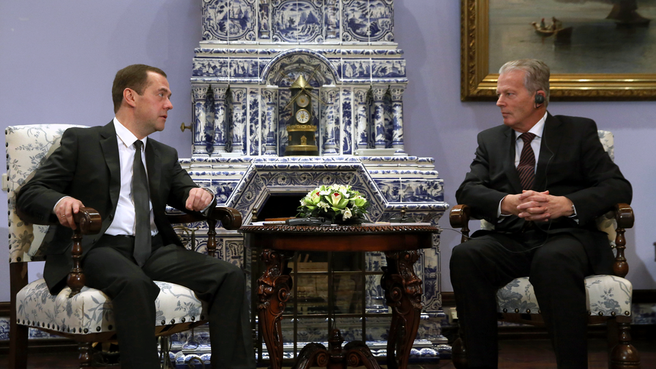The officials discussed bilateral economic interaction, primarily ways of increasing bilateral trade and expanding energy, cultural and humanitarian ties.
From the transcript:
Dmitry Medvedev: Russia and Austria have always had advanced economic ties and we would not want to lose them even in the present complicated economic situation.
The dynamics of our economic ties are multidirectional. We have managed to preserve investment that was made in the preceding period and even increase it. However, there has also been a decline, which is related to trade turnover, which, for its part, is due to objective economic conditions (falling energy prices) and subjective decisions, which involve the introduction of sanctions against Russia and Russia’s subsequent countermeasures.
We believe that sanctions do not bring any good to anybody. During my talks with the EU leadership and certain heads of state and government, nobody told me that sanctions are a positive development or that they are producing positive results. On the contrary, everyone says that they are bad, but nevertheless the situation continues.
Let the European Union make up its mind.
I view any contact, such as the Intergovernmental Commission meeting that you had with your colleagues, as a positive.
President Fischer is due to come to Russia in April. We are looking forward to his visit.
Reinhold Mitterlehner (via interpreter): We used to have good contact. Unfortunately, today, due to the introduction of sanctions, our trade ties have shrunk and investment has declined. This applies to both sides. Exports and imports have also dropped. These are the losses that we are sustaining.
Austria cannot lift the sanctions, as we are part of the European Union. This has to do primarily with the development of the Minsk process. Ukraine plays a central role in ensuring the implementation of the Minsk Agreements.
Nevertheless, we are working to develop bilateral ties. I am greatly pleased that yesterday, the 15th meeting of the mixed commission took place. Essentially, it helped synchronise and continue our efforts toward a deeper partnership in the modernisation area. We addressed not only issues related to trade in raw materials. We want to move away from raw materials and move into the technology sphere. We have mapped out 26 different projects. We also want to develop tourism, cross-cultural tourism. In 2017, we will hold the year of tourism.
The question we should ask is whether we are in a position to implement the Nord Stream-2 project together to ensure a more reliable distribution of gas to Europe and deepen our ties. We addressed this again with Russian Energy Minister Novak (Minister of Energy of the Russian Federation) and Gazprom CEO Miller and we achieved highly positive results here.
We have a good basis for the development of bilateral ties, and both countries should take advantage of it.
Russia’s role is important in resolving the Syrian problem and ensuring a lasting peace in the region. It is essential to fight terrorism around the world. We are also affected by this problem. This is due primarily to the flow of refugees to Europe. If we could find a joint solution to this issue this would open great opportunities for Russia to participate in the collective effort to deal with the refugee problem.
<…>













